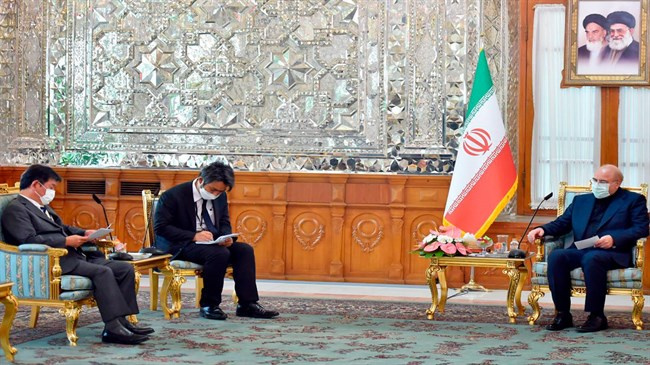Parliament speaker urges Japan to unfreeze Iran’s assets

Iran’s Parliament speaker said Tokyo should take serious steps to unfreeze Tehran’s assets blocked in Japanese banks, especially under the present circumstances that the Islamic Republic is grappling with the deadly COVID-19 pandemic.
Mohammad Baqer Qalibaf made the remarks in a Sunday meeting with the visiting Japanese Foreign Minister Toshimitsu Motegi in Tehran, during which the two sides discussed issues of mutual interest as well as regional and global developments, Press TV reported.
Qalibaf thanked the Japanese side for donating 2.9 million COVID-19 vaccine doses to Tehran, saying that humanitarian cooperation between Tehran and Tokyo has been a hallmark of their 90-year-old diplomatic relations.
Qalibaf, however, criticized Japan’s measure to freeze Iranian assets in the country’s banks under US pressure, saying, “We expect the government of Japan to act seriously to unfreeze Iran’s assets, especially in order to ease the fight against the COVID-19 pandemic.”
In a meeting with the Japanese foreign minister earlier in the day, Iranian President Seyyed Ebrahim Raeisi had sharply criticized Japan for refusing to release the frozen assets.
Commenting on Washington’s unilateral move in 2018 to pull out of the 2015 nuclear deal, officially known as the Joint Comprehensive Plan of Action (JCPOA), Qalibaf said, by withdrawing from the deal, Washington stepped on all forms of multilateral and international interactions and reimposed its illegal unilateral sanctions on the Iranian people and government.
As a party to the JCPOA, Iran has completely fulfilled its commitments, he noted, adding, “Americans must live up to their commitments. The US acts of obstruction have made it impossible [for Iran] to even purchase medicine during the COVID-19 pandemic. We expect Japan, as a peace-loving country, to show serious reaction to this issue.”
Iran has been fighting back against one of the deadliest COVID-19 outbreaks in the world, with the harsh US sanctions significantly hampering efforts to contain the spread of the virus in the country.
The sanctions were imposed by the administration of former US president Donald Trump under a “maximum pressure” campaign and have been maintained by the current administration of Joe Biden, which has refused to soften the bans.
Iranian officials have occasionally described the sanctions as “economic terrorism” and “medical terrorism” over their deadly impact on ordinary people.
As early as March 2020, when Iran was fighting its first COVID-19 wave, Foreign Minister Mohammad Javad Zarif urged the international community to play its real role and stop the US medical terrorism against Iran.
“The global community must come to its senses and help Iran in order to stop the economic, medical and drug terrorism [by the US],” Zarif wrote in an op-ed published by Russian business newspaper Kommersant on March 30, 2020.
So far, over 102,000 people have lost their lives in Iran due to the pandemic, with daily deaths exceeding 600 over the past few days.
The Japanese foreign minister said his country precisely monitors regional developments and the Vienna talks aimed at reviving the JCPOA, adding more negotiations are required to resolve very complicated issues.
Tokyo emphasizes full commitment to the deal by all the JCPOA signatories, Motegi said.
He also stressed the importance of improving trade and economic cooperation between Tehran and Tokyo.
Source: Iran Daily

